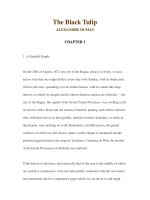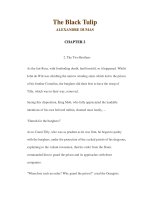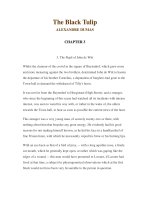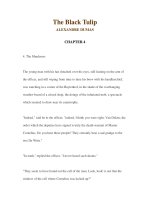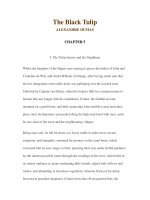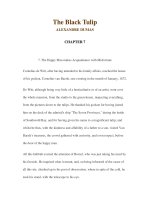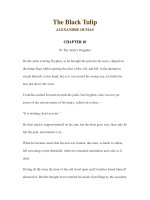LUYỆN ĐỌC TIẾNG ANH QUA CÁC TÁC PHẨM VĂN HỌC – THE MAN IN THE IRON MASK ALEXANDRE DUMAS CHAPTER 17 pps
Bạn đang xem bản rút gọn của tài liệu. Xem và tải ngay bản đầy đủ của tài liệu tại đây (37.21 KB, 14 trang )
THE MAN IN THE IRON MASK
ALEXANDRE DUMAS
CHAPTER 17
High Treason
The ungovernable fury which took possession of the King at the sight and at the
perusal of Fouquet’s letter to La Valliere by degrees subsided into a feeling of
painful weariness. Youth, full of health and life, and requiring that what it loses
should be immediately restored,- youth knows not those endless, sleepless
nights which realize to the unhappy the fable of the liver of Prometheus,
unceasingly renewed. In instances where the man of middle life in his acquired
strength of will and purpose, and the old man in his state of exhaustion find an
incessant renewal of their sorrow, a young man, surprised by the sudden
appearance of a misfortune, weakens himself in sighs and groans and tears, in
direct struggles with it, and is thereby far sooner overthrown by the inflexible
enemy with whom he is engaged. Once overthrown, his sufferings cease. Louis
was conquered in a quarter of an hour. Then he ceased to clinch his hands, and
to burn with his looks the invisible objects of his hatred; he ceased to attack
with violent imprecations M. Fouquet and La Valliere: from fury he subsided
into despair, and from despair to prostration. After he had thrown himself for a
few minutes to and fro convulsively on his bed, his nerveless arms fell quietly
down, his head lay languidly on his pillow; his limbs, exhausted by his
excessive emotions, still trembled occasionally, agitated by slight muscular
contractions; and from his breast only faint and unfrequent sighs still issued.
Morpheus, the tutelary deity of the apartment which bore his name, towards
whom Louis raised his eyes, wearied by his anger and reddened by his tears,
showered down upon him copiously the sleep-inducing poppies, so that the
King gently closed his eyes and fell asleep. Then it seemed to him, as it often
happens in that first sleep, so light and gentle, which raises the body above the
couch, the soul above the earth,- it seemed to him as if the god Morpheus,
painted on the ceiling, looked at him with eyes quite human; that something
shone brightly, and moved to and fro in the dome above the sleeper; that the
crowd of terrible dreams, moving off for an instant, left uncovered a human
face, with a hand resting against the mouth, and in an attitude of deep and
absorbed meditation. And strange enough, too, this man bore so wonderful a
resemblance to the King himself, that Louis fancied he was looking at his own
face reflected in a mirror; only, that face was saddened by a feeling of the
profoundest pity. Then it seemed to him as if the dome gradually retired,
escaping from his gaze, and that the figures and attributes painted by Lebrun
became darker and darker as the distance became more and more remote. A
gentle, easy movement, as regular as that by which a vessel plunges beneath the
waves, had succeeded to the immovableness of the bed. Doubtless the King was
dreaming; and in this dream the crown of gold which fastened the curtains
together seemed to recede from his vision, just as the dome, to which it
remained suspended, had done; so that the winged genius which with both its
hands supported the crown seemed, though vainly so, to call upon the King,
who was fast disappearing from it.
The bed still sank. Louis, with his eyes open, could not resist the deception of
this cruel hallucination. At last, as the light of the royal chamber faded away
into darkness and gloom, something cold, gloomy, and inexplicable seemed to
infect the air. No paintings, nor gold, nor velvet hangings were visible any
longer,- nothing but walls of a dull gray color, which the increasing gloom made
darker every moment. And yet the bed still continued to descend; and after a
minute, which seemed in its duration almost an age to the King, it reached a
stratum of air black and still as death, and then it stopped. The King could no
longer see the light in his room, except as from the bottom of a well we can see
the light of day. “I am under the influence of a terrible dream,” he thought. “It is
time to arouse myself. Come, let us wake up!”
Every one has experienced what the above remark conveys; there is no one who
in the midst of a suffocating nightmare has not said to himself, by the help of
that light which still burns in the brain when every human light is extinguished,
“It is nothing but a dream, after all.” This was precisely what Louis XIV said to
himself. But when he said, “Let us wake up,” he perceived that not only was he
already awake, but still more, that he had his eyes open also. He then looked
around him. On his right hand and on his left two armed men stood silently,
each wrapped in a huge cloak, and the face covered with a mask; one of them
held a small lamp in his hand, whose glimmering light revealed the saddest
picture a king could look upon.
Louis said to himself that his dream still lasted, and that all he had to do to
cause it to disappear was to move his arms or to say something aloud. He darted
from his bed, and found himself upon the damp ground. Then, addressing
himself to the man who held the lamp in his hand, he said, “What is this,
Monsieur, and what is the meaning of this jest?”
“It is no jest,” replied, in a deep voice, the masked figure that held the lantern.
“Do you belong to M. Fouquet?” inquired the King, greatly astonished at his
situation.
“It matters very little to whom we belong,” said the phantom. “We are your
masters; that is sufficient.”
The King, more impatient than intimidated, turned to the other masked figure.
“If this is a comedy,” he said, “you will tell M. Fouquet that I find it unseemly,
and that I desire it should cease.”
The second masked person to whom the King had addressed himself was a man
of huge stature and vast circumference. He held himself erect and motionless as
a block of marble.
“Well,” added the King, stamping his foot, “you do not answer!”
“We do not answer you, my good monsieur,” said the giant, in a stentorian
voice, “because there is nothing to answer, except that you are the chief
facheux, and that M. Coquelin de Voliere forgot to include you in the number of
his.”
“At least, tell me what you want!” exclaimed Louis, folding his arms with a
passionate gesture.
“You will know by and by,” replied the man who held the lamp.
“In the meantime tell me where I am.”
“Look!”
Louis looked all round him; but by the light of the lamp which the masked
figure raised for the purpose, he could perceive nothing but the damp walls,
which glistened here and there with the slimy traces of the snail. “Oh! oh! a
dungeon,” said the King.
“No, a subterranean passage.”
“Which leads-”
“Will you be good enough to follow us?”
“I shall not stir from hence!” cried the King.
“If you are obstinate, my dear young friend,” replied the taller and stouter of the
two, “I will lift you up in my arms, will roll you up in a cloak, and if you are
stifled there, why, so much the worse for you!” and as he said this he
disengaged from beneath the cloak with which he had threatened the King a
hand of which Milo of Crotona would have envied him the possession on the
day when he had that unhappy idea of rending his last oak.
The King dreaded violence; for he could well believe that the two men into
whose power he had fallen had not gone so far with any idea of drawing back,
and that they would consequently be ready to proceed to extremities if
necessary. He shook his head, and said: “It seems I have fallen into the hands of
a couple of assassins. Move on, then!”
Neither of the men answered a word to this remark. The one who carried the
lantern walked first, the King followed him, while the second masked figure
closed the procession. In this manner they passed along a winding gallery of
some length, with as many staircases leading out of it as are to be found in the
mysterious and gloomy palace of Ann Radcliffe. All these windings, throughout
which the King heard the sound of falling water over his head, ended at last in a
long corridor closed by an iron door. The figure with the lamp opened the door
with one of the keys he wore suspended at his girdle, where during the whole of
the time the King had heard them rattle. As soon as the door was opened and
admitted the air, Louis recognized the balmy odors which the trees exhale after
a hot summer’s day. He paused hesitatingly for a moment or two; but his huge
companion who followed him thrust him out of the subterranean passage.
“Another blow!” said the King, turning towards the one who had just had the
audacity to touch his sovereign; “what do you intend to do with the King of
France?”
“Try to forget that word,” replied the man with the lamp, in a tone which as
little admitted of reply as one of the famous decrees of Minos.
“You deserve to be broken on the wheel for the word you have just made use
of,” said the giant, as he extinguished the lamp his companion handed to him;
“but the King is too kind-hearted.”
Louis, at that threat, made so sudden a movement that it seemed as if he
meditated flight; but the giant’s hand was placed on his shoulder, and fixed him
motionless where he stood. “But tell me, at least, where we are going,” said the
King.
“Come!” replied the former of the two men, with a kind of respect in his
manner, and leading his prisoner towards a carriage which seemed to be in
waiting.
The carriage was completely concealed amid the trees. Two horses, with their
feet fettered, were fastened by a halter to the lower branches of a large oak.
“Get in,” said the same man, opening the carriage door and letting down the
step. The King obeyed, seated himself at the back of the carriage, the padded
door of which was shut and locked immediately upon him and his guide. As for
the giant, he cut the fastenings by which the horses were bound, harnessed them
himself, and mounted on the box of the carriage, which was unoccupied. The
carriage set off immediately at a quick trot, turned into the road to Paris, and in
the forest of Senart found a relay of horses fastened to the trees in the same
manner in which the first horses had been, and without a postilion. The man on
the box changed the horses, and continued to follow the road towards Paris with
the same rapidity, and entered the city about three o’clock in the morning. The
carriage proceeded along the Faubourg St. Antoine, and after having called out
to the sentinel, “By the King’s order!” the driver conducted the horses into the
circular enclosure of the Bastille, looking out upon the courtyard called La Cour
du Gouvernement. There the horses drew up, reeking with sweat, at the flight of
steps, and a sergeant of the guard ran forward.
“Go and wake the governor!” said the coachman, in a voice of thunder.
With the exception of this voice, which might have been heard at the entrance of
the Faubourg St. Antoine, everything remained as calm in the carriage as in the
prison. Ten minutes afterwards, M. de Baisemeaux appeared in his dressing-
gown on the threshold of the door. “What is the matter now?” he asked; “and
whom have you brought me there?”
The man with the lantern opened the carriage door, and said two or three words
to the one who acted as driver, who immediately got down from his seat, took
up a short musket which he kept under his feet, and placed its muzzle on the
prisoner’s chest.
“Fire at once if he speaks!” added, aloud, the man who alighted from the
carriage.
“Very good!” replied his companion, without any other remark.
With this recommendation, the person who had accompanied the King in the
carriage ascended the flight of steps, at the top of which the governor was
awaiting him. “M. d’Herblay!” said the latter.
“Hush!” said Aramis; “Let us go into your room.”
“Good heavens! what brings you here at this hour?”
“A mistake, my dear M. de Baisemeaux,” Aramis replied quietly. “It appears
that you were right the other day.”
“What about?” inquired the governor.
“About the order of release, my dear friend.”
“Tell me what you mean, Monsieur,- no, Monseigneur,” said the governor,
almost suffocated by surprise and terror.
“It is a very simple affair. You remember, dear M. de Baisemeaux, that an order
of release was sent to you?”
“Yes, for Marchiali.”
“Very good! we both thought that it was for Marchiali?”
“Certainly. You will recollect, however, that I did not believe it; that I was
unwilling; that you compelled me.”
“Oh, Baisemeaux, my good fellow, what a word to make use of!- advised, that
was all.”
“Advised,- yes, advised me to give him up to you; and that you carried him off
with you in your carriage.”
“Well, my dear M. de Baisemeaux, it was a mistake. It was discovered at the
Ministry; so that I now bring you an order from the King to set at liberty
Seldon,- that poor devil of a Scotchman, you know.”
“Seldon! are you sure this time?”
“Well, read it yourself,” added Aramis, handing him the order.
“Why,” said Baisemeaux, “this order is the very same that has already passed
through my hands.”
“Indeed?”
“It is the very one I assured you I saw the other evening. Parbleu! I recognize it
by the blot of ink.”
“I do not know whether it is that; but, at any rate, it is the one I bring you.”
“But, then, about the other?”
“What other?”
“Marchiali?”
“I have him here with me.”
“But that is not enough for me. I require a new order to take him back again.”
“Don’t talk such nonsense, my dear Baisemeaux; you talk like a child! Where is
the order you received respecting Marchiali?”
Baisemeaux ran to his iron chest and took it out. Aramis seized hold of it, coolly
tore it in four pieces, held them to the lamp, and burned them.
“Good heavens! what are you doing?” exclaimed Baisemeaux, in an extremity
of terror.
“Look at your position a little, my dear governor,” said Aramis, with his
imperturbable self-possession, “and you will see that it is very simple. You no
longer possess any order justifying Marchiali’s release.”
“I am a lost man!”
“Far from it, my good fellow, since I have brought Marchiali back to you, and it
is just the same as if he had never left.”
“Ah!” said the governor, completely overcome by terror.
“Plain enough, you see; and you will go and shut him up immediately.”
“I should think so, indeed.”
“And you will hand over to me this Seldon, whose liberation is authorized by
this order. In this way you square your conduct; do you understand?”
“I- I-”
“You do understand, I see,” said Aramis. “Very good!”
Baisemeaux clasped his hands together.
“But why, at all events, after having taken Marchiali away from me, do you
bring him back again?” cried the unhappy governor, in a paroxysm of terror and
completely dumfounded.
“For a friend such as you are,” said Aramis, “for so devoted a servant, I have no
secrets”; and he put his mouth close to Baisemeaux’s ear, as he said in a low
tone of voice, “you know the resemblance between that unfortunate fellow and-
”
“And the King?- yes.”
“Very good; the very first use that Marchiali made of his liberty was to pretend-
Can you guess what?”
“How is it likely I should guess?”
“To pretend that he was the King of France.”
“Oh, the wretch!” cried Baisemeaux.
“To dress himself up in clothes like those of the King, and attempt to play the
role of usurper.”
“Gracious heavens!”
“That is the reason why I have brought him back again, my dear friend. He is
mad, and lets every one see how mad he is.”
“What is to be done, then?”
“That is very simple; let no one hold any communication with him. You
understand that when his peculiar style of madness came to the King’s ears, the
King, who had pitied his terrible affliction, and saw how his kindness of heart
had been repaid by such black ingratitude, became perfectly furious; so that
now,- and remember this very distinctly, dear M. de Baisemeaux, for it concerns
you most closely,- so that there is now, I repeat, sentence of death pronounced
against all those who may allow him to communicate with any one else save me
or the King himself. You understand, Baisemeaux,- sentence of death!”
“Do I understand? Morbleu!”
“And now go down and conduct this poor devil back to his dungeon again,
unless you prefer he should come up here.”
“What would be the good of that?”
“It would be better, perhaps, to enter his name in the prison-book at once!”
“Pardieu!”
“Well, then, have him up!”
Baisemeaux ordered the drums to be beaten and the bell to be rung, as a
warning to every one to retire in order to avoid meeting a mysterious prisoner.
Then, when the passages were free, he went to take the prisoner from the
carriage, at whose breast Porthos, faithful to the directions which had been
given him, still kept his musket levelled. “Ah! is that you, miserable wretch?”
cried the governor, as soon as he perceived the King. “Very good, very good!”
and immediately, making the King get out of the carriage, he led him, still
accompanied by Porthos, who had not taken off his mask, and Aramis, who
again resumed his, up the stairs, to the second Bertaudiere, and opened the door
of the room in which Philippe for six long years had bemoaned his existence.
The King entered the cell without pronouncing a single word; he was pale and
haggard.
Baisemeaux shut the door upon him, turned the key twice in the lock, and then
returned to Aramis. “It is quite true,” he said in a low tone, “that he has a rather
strong resemblance to the King, but still less so than you said.”
“So that,” said Aramis, “you would not have been deceived by the substitution
of the one for the other.”
“What a question!” “You are a most valuable fellow, Baisemeaux,” said
Aramis; “and now, set Seldon free!”
“Oh, yes; I was going to forget that. I will go and give orders at once.”
“Bah! to-morrow will be time enough.”
“To-morrow!- oh, no! This very minute!”
“Well, go off to your affairs! I shall go away to mine. But it is quite understood,
is it not?”
“What is ‘quite understood’?”
“That no one is to enter the prisoner’s cell, except with an order from the King,-
an order which I will myself bring.”
“That is understood. Adieu, Monseigneur!” Aramis returned to his companion.
“Now, Porthos, my good fellow, back again to Vaux, and as fast as possible!”
“A man is light when he has faithfully served his King, and in serving him
saved his country,” said Porthos. “The horses will have nothing to draw. Let us
be off!” and the carriage, lightened of a prisoner who in fact seemed to Aramis
very heavy, passed across the drawbridge of the Bastille, which was raised
again immediately behind it.
